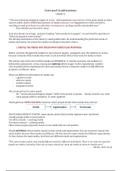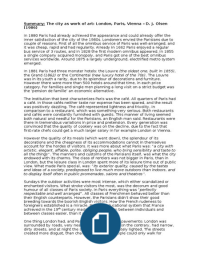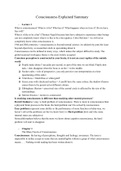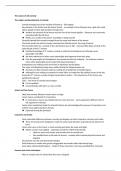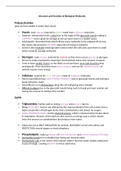Uses and Gratifications
(week 7)
“The social and psychological origins of n eeds, which generate e
xpectations of the mass media or other
sources,which lead to differential patterns of media exposure (or engagement in other activities),
resulting in need gratifications and other c
onsequences, perhaps mostly unintended ones.”
- Katz, Blumler and Gurevitch (1974)
Katz introduced a new logic: instead of asking “what media do to people”, he switched the question to:
“What do people do with media?”
The driving mechanism of the theory is need gratification. By understanding the particular needs of
media consumers, the reason for media consumption becomes clearer.
1. PEOPLE USE MEDIA FOR THEIR OWN PARTICULAR PURPOSES:
Before, scholars thought that audiences were passive targets, uses&grats sees the audience as active,
because it decides which media they want to use and what effects they want the media to have.
The classic view is the one in which media are POWERFUL: it reaches everyone, the audience is
defenceless and passive, it has a strong and u
niform effect (magic-bullet, hypodermic-needle).
Uses & gratifications emphasizes the personal media choices consumers make to fulfill different
purposes at different times.
There are different motivations for media use:
- cognitive needs
- affective needs
- tension release
- integrative needs
Not everyone has the same needs:
- the “social and psychological origins” differ from person to person - family, friends, uni, work
- some people seek for sensation, or need cognition.
Needs generate EXPECTATIONS, based on which people decide which media they will use.
MOOD MANAGEMENT THEORY: expectations about which media regulates your mood best.
Usually people prefer to feel positive.
Too little arousal-> exciting media
Too much arousal-> calming media
Other times people purposely choose to use media that are not positive
People ACTIVELY c hoose media, based on their needs and expectations. But not everyone chooses the
same media: because their needs are different, OR they have the same needs but different expectations.
Or they choose the same media, but they have different needs and expectations.
“The same media content may gratify different needs for different individuals. There is not only one way that
people use media. Contrarily, there are as many reasons for using the media as there are media users”
- Blumer, Katz (1974)
(week 7)
“The social and psychological origins of n eeds, which generate e
xpectations of the mass media or other
sources,which lead to differential patterns of media exposure (or engagement in other activities),
resulting in need gratifications and other c
onsequences, perhaps mostly unintended ones.”
- Katz, Blumler and Gurevitch (1974)
Katz introduced a new logic: instead of asking “what media do to people”, he switched the question to:
“What do people do with media?”
The driving mechanism of the theory is need gratification. By understanding the particular needs of
media consumers, the reason for media consumption becomes clearer.
1. PEOPLE USE MEDIA FOR THEIR OWN PARTICULAR PURPOSES:
Before, scholars thought that audiences were passive targets, uses&grats sees the audience as active,
because it decides which media they want to use and what effects they want the media to have.
The classic view is the one in which media are POWERFUL: it reaches everyone, the audience is
defenceless and passive, it has a strong and u
niform effect (magic-bullet, hypodermic-needle).
Uses & gratifications emphasizes the personal media choices consumers make to fulfill different
purposes at different times.
There are different motivations for media use:
- cognitive needs
- affective needs
- tension release
- integrative needs
Not everyone has the same needs:
- the “social and psychological origins” differ from person to person - family, friends, uni, work
- some people seek for sensation, or need cognition.
Needs generate EXPECTATIONS, based on which people decide which media they will use.
MOOD MANAGEMENT THEORY: expectations about which media regulates your mood best.
Usually people prefer to feel positive.
Too little arousal-> exciting media
Too much arousal-> calming media
Other times people purposely choose to use media that are not positive
People ACTIVELY c hoose media, based on their needs and expectations. But not everyone chooses the
same media: because their needs are different, OR they have the same needs but different expectations.
Or they choose the same media, but they have different needs and expectations.
“The same media content may gratify different needs for different individuals. There is not only one way that
people use media. Contrarily, there are as many reasons for using the media as there are media users”
- Blumer, Katz (1974)


